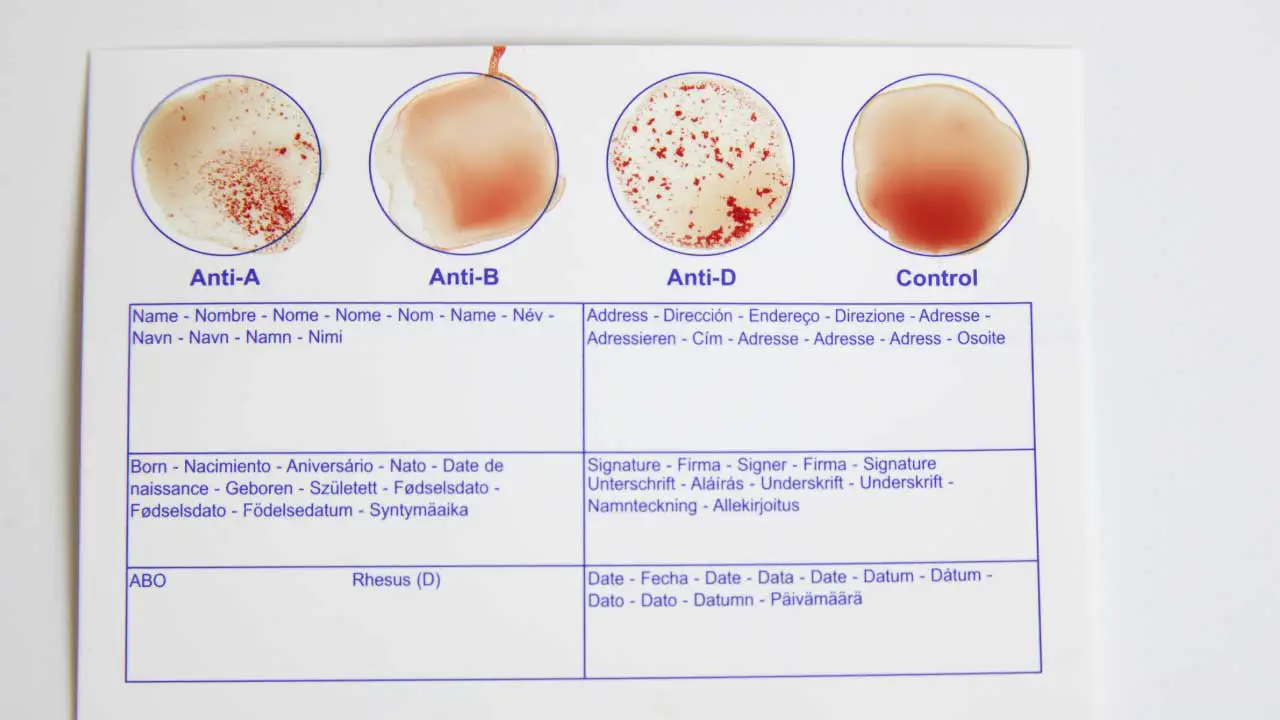Your blood type, determined by the presence or absence of specific antigens on red blood cells (ABO and Rh systems), is crucial for safe blood transfusions and can reveal insights into your health and genetic heritage. You can discover your blood type through various methods: convenient at-home blood type test kits, which offer quick results via a finger prick (ensure reputable suppliers); professional testing at walk-in laboratories and clinics, providing highly accurate results; blood typing ordered by your doctor during checkups; or by donating blood, where your type is automatically tested.
Whether you’re a parent eager to understand your child’s genetic makeup, a teacher seeking an engaging science lesson, or simply curious about your own body, knowing your blood type can unlock a world of knowledge. Let’s explore the significance of blood types and how you can easily discover yours.
Quick guide
Eldoncard INC Blood Type Test (At-home test kit)
- Tests for: ABO and Rh blood types
- How it works: Buy a kit from Amazon.com and follow the instructions on the kit.
- Specimen required: Finger prick blood sample
- Results in: Approximately 2 minutes, with visible agglutination indicating the blood type.
D’Adamo Personalized Nutrition Home Blood Type Testing Kit (At-home test kit)
- Tests for: ABO and Rh blood types
- How it works: Buy a kit from Amazon.com and follow the instructions on the kit.
- Specimen required: Finger prick blood sample
- Results in: Within a few minutes, with visual confirmation of agglutination.
ALDON Innovating Science ABO/RH Blood Type Test Kit (At-home test kit)
- Tests for: ABO and Rh blood types
- How it works: Buy a kit from Amazon.com and follow the instructions on the kit.
- Specimen required: Finger prick blood sample
- Results in: Within 3 minutes, with visual confirmation of agglutination.
Personalabs Blood Type Test (Walk-in Lab)
- Tests for: ABO and Rh blood types
- How it works: Buy a lab test from Personalabs.com and schedule an appointment at your nearest local lab
- Specimen required: Blood from the veins
- Results in: 2 – 10 business days
Disclaimer: This information is based on research and is accurate to the best of our knowledge at the time of publication. Please note that the writer has not personally used or tested these products.
What are Blood Types and Why are They Important?
The ABO and Rh systems are the two primary ways blood types are classified, and they rely on the interplay of antigens and antibodies. The ABO system categorizes blood into four types: A, B, AB, and O. This classification is based on the presence or absence of A and B antigens on the surface of red blood cells. Type A blood has A antigens, type B has B antigens, type AB has both, and type O has neither. Simultaneously, your body produces antibodies against the antigens it lacks. For instance, type A blood has anti-B antibodies and type B blood has anti-A antibodies.
The Rh system determines whether your blood is Rh-positive or Rh-negative based on the presence or absence of the Rh factor, an additional protein. Rh-positive blood has the Rh factor, while Rh-negative blood does not. Our red blood cells do express a significant number of Rh antigens when they are present (in Rh-positive individuals). The presence of these antigens is sufficient to trigger a robust immune response in Rh-negative individuals exposed to Rh-positive blood. This is the basis of Rh incompatibility.
Antigens and antibodies play a critical role in determining blood types. Antigens are substances that trigger an immune response, while antibodies are proteins produced by the immune system to neutralize foreign invaders. Incompatible blood types lead to agglutination (clumping) of red blood cells due to antibody-antigen reactions, which can be life-threatening.
Genetic inheritance of blood types follows simple Mendelian patterns. Each parent contributes one allele (gene variant) that determines the ABO and Rh type. The A and B alleles are codominant, meaning if both are present, they are both expressed (AB blood type). The O allele is recessive, meaning it is only expressed if two copies are present (O blood type). The Rh-positive allele is dominant over the Rh-negative allele.
Accurate blood typing is paramount for several reasons.
Primarily, it prevents transfusion reactions. Incompatible blood transfusions can cause severe complications, including kidney failure and death. Accurate blood typing is also vital during pregnancy to prevent Rh incompatibility, a condition where an Rh-negative mother carries an Rh-positive fetus, potentially leading to hemolytic disease in the newborn. Furthermore, accurate blood typing is crucial for medical records, emergency situations, and certain medical procedures.
When Should You Consider a Blood Type Test?
Knowing when to consider a blood type test is crucial for both medical necessity and personal awareness.
Pregnancy and Prenatal Care
Routine Testing
All pregnant women should undergo blood typing, including ABO and Rh factor testing, as part of their initial prenatal care. This is essential to identify potential Rh incompatibility, which can lead to hemolytic disease in the newborn (HDN).
Rh Incompatibility Management
If the mother is Rh-negative and the father is Rh-positive, there’s a risk the baby will be Rh-positive. In such cases, the mother may receive Rh immunoglobulin (RhoGAM) injections to prevent her immune system from producing anti-Rh antibodies. Knowing the blood type early through blood typing allows for preventative measures to be taken.
Pre-Surgical Requirements
Blood Transfusion Preparedness
Hospitals routinely require blood typing before surgeries or procedures that may involve blood loss or the need for a transfusion. This ensures compatible blood is readily available in case of an emergency. This is a standard safety protocol.
Family Planning and Rh Factor Awareness
Couples planning a pregnancy, especially if the woman is Rh-negative, should consider knowing their Rh factors.This allows them to be aware of the potential for Rh incompatibility and discuss preventive measures with their healthcare provider. Knowing blood types through blood typing can be useful in genetic counseling.
Personal Curiosity and Self-Discovery
Genetic Interest
Many individuals are simply curious about their blood type and how it’s inherited. It’s a way to learn more about their genetic makeup and family history.
Personal Health Awareness
Some people want to know their blood type for personal records or to be prepared for emergencies.
Educational Purposes
Science Education
Teachers and educators can use blood typing as a practical demonstration of genetic inheritance and immunology. It’s an engaging hands-on activity for science classes or show-and-tell.
Home Science
Parents may purchase at home kits to teach children about blood types.
When Needing Accurate Blood Typing for Medical Records
Medical History
Having your blood type documented in your medical records is essential for accurate and timely medical care. This information can be crucial in emergency situations.
Certain Medical Conditions
Some medical conditions may require regular blood tests, including blood typing.
Blood Donation
If you intend to donate blood, you will have to have your blood type tested.
Emergency Situations
In trauma or emergency situations, knowing your blood type can expedite the process of providing life-saving blood transfusions. Having a card or other form of identification with your blood type can be beneficial.
How does Blood Typing Test Work?
Blood typing tests work by detecting the presence or absence of specific antigens on the surface of red blood cells. A blood sample is required. This can be obtained through a finger prick (for at-home tests) or a venipuncture (drawing blood from a vein) in a clinical setting.
ABO Typing
Forward Typing
The blood sample is mixed with antibodies that specifically target A antigens (anti-A antibodies) and antibodies that target B antigens (anti-B antibodies). If the red blood cells clump together (agglutinate) when mixed with anti-A antibodies, it indicates the presence of A antigens. Agglutination (clumping) indicates a positive reaction between the antigens on the red blood cells and the antibodies in the testing reagents.
Similarly, if agglutination occurs with anti-B antibodies, it indicates the presence of B antigens. By observing the agglutination patterns, the ABO blood type is determined.
Reverse Typing
This step confirms the forward typing results. The plasma (the liquid portion of the blood) is mixed with red blood cells of known A and B types. The presence of antibodies in the plasma that cause agglutination with these known red blood cells further confirms the ABO blood type.
Rh Typing
The blood sample is mixed with antibodies that target the Rh factor (anti-Rh antibodies). If agglutination occurs, it indicates the presence of the Rh factor, and the blood type is Rh-positive. If no agglutination occurs, the blood type is Rh-negative.
Interpretation
| Blood Type | Antigens Present on Red Blood Cells | Antibodies Present in Plasma | Can Receive Blood From | Can Donate Blood To |
| A+ | A, Rh | Anti-B | A+, A-, O+, O- | A+, AB+ |
| A- | A | Anti-B, Anti-Rh | A-, O- | A+, A-, AB+, AB- |
| B+ | B, Rh | Anti-A | B+, B-, O+, O- | B+, AB+ |
| B- | B | Anti-A, Anti-Rh | B-, O- | B+, B-, AB+, AB- |
| AB+ | A, B, Rh | None | All blood types | AB+ |
| AB- | A, B | Anti-Rh | AB-, A-, B-, O- | AB+, AB- |
| O+ | Rh | Anti-A, Anti-B | O+, O- | A+, B+, AB+, O+ |
| O- | None | Anti-A, Anti-B, Anti-Rh | O- | All blood types |
At-Home Blood Type Tests
At-home blood typing kits utilize similar principles, often employing cards or strips coated with antibodies. The user places a drop of blood on the designated areas and observes the resulting reactions.
Clinical Tests
Clinical laboratory tests are performed with precise equipment and controls, ensuring high accuracy.
Recommended Tests
When choosing a blood type test, consider factors such as cost, convenience, and accuracy. At-home kits are ideal for quick insights, while professional lab tests offer greater reliability. Matching your testing option to your specific needs is crucial. Ensure you obtain reliable results from any blood type test you take.
Blood Testing Options: Advantages and Disadvantages
| Option | Advantages | Disadvantages |
| At-Home Blood Type Test Kits | Convenience: Can be done at home, on your own schedule. Privacy. Relatively low cost. Quick results. Educational use. | Potential for user error, affecting accuracy. Requires careful adherence to instructions. Quality varies between brands; reputable brands are vital. May not be suitable for medical purposes requiring official documentation. Disposal of biohazard material. |
| Walk-In Laboratories and Clinics | High accuracy and reliability. Professional handling and interpretation of results. Medical documentation available. Suitable for medical purposes. Can often be done without a doctor’s referral. | Higher cost compared to at-home kits. Requires travel to the facility. May involve waiting times. Less privacy than at home tests. |
| Doctor’s Office | Integrated into medical records. Performed by trained professionals. Results can be discussed with your doctor. May be covered by insurance. Can be combined with other tests. | Requires a doctor’s appointment. May involve longer wait times for scheduling and results. Cost may be higher, depending on insurance coverage. Less convenient than at-home testing. |
Eldoncard INC Blood Type Test (At-home test kit)
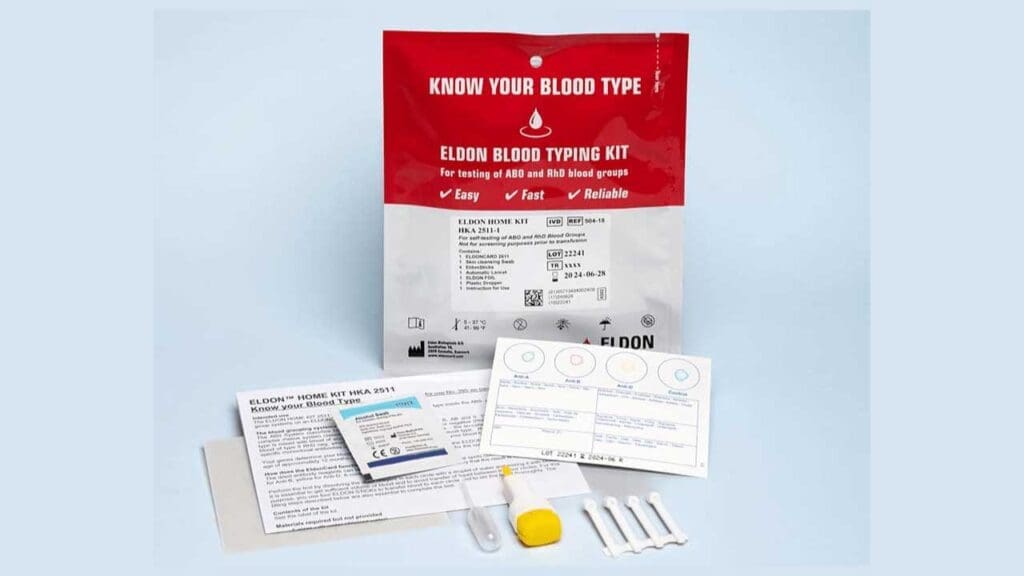
- Tests for: ABO and Rh blood types
- How it works: Buy a kit from Amazon.com and follow the instructions on the kit.
- Specimen required: Finger prick blood sample
- Results in: Approximately 2 minutes, with visible agglutination indicating the blood type.
About the test
The Eldoncard INC Blood Type Test involves hydrating reagent areas on a specialized card with distilled water, pricking a finger with a lancet to obtain a blood sample, mixing drops of blood with each reagent area using separate sticks, observing for agglutination (clumping) within two minutes, and comparing the clumping patterns to a provided chart to determine ABO and Rh blood type, ensuring to check the control circle for validity, and then safely disposing of the used materials. Do not tilt the card but wait for it to dry.
| Pros | Cons |
|---|---|
| ✅ Easy to use ✅ Clear instructions and video tutorials ✅ Excellent value | ❌ Need to do finger prick using a lancet ❌ Requires 4 drops of blood |
D’Adamo Personalized Nutrition Home Blood Type Testing Kit (At-home test kit)
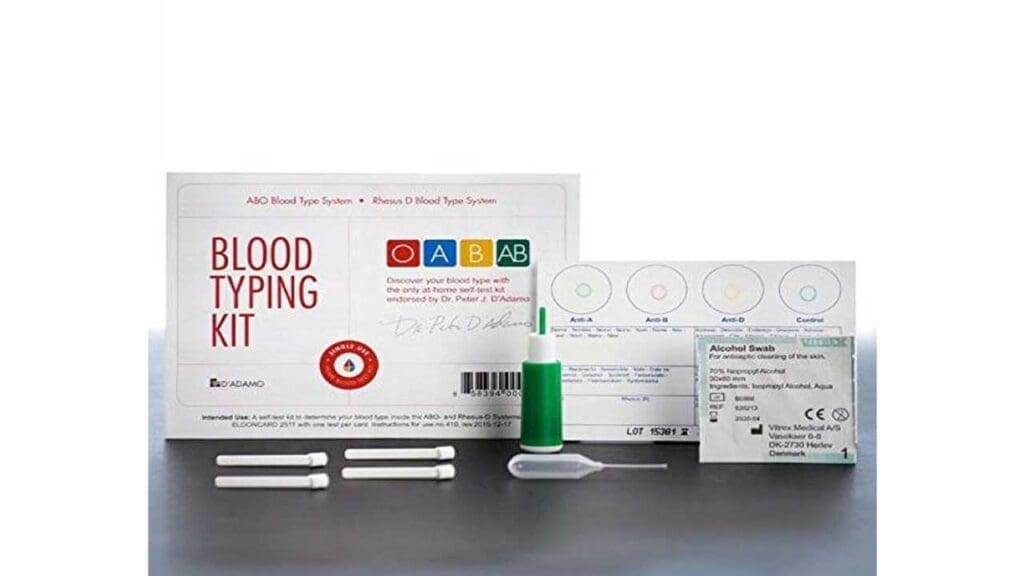
- Tests for: ABO and Rh blood types
- How it works: Buy a kit from Amazon.com and follow the instructions on the kit.
- Specimen required: Finger prick blood sample
- Results in: Within a few minutes, with visual confirmation of agglutination
About the test
The D’Adamo Personalized Nutrition Home Blood Type Testing Kit, using the Eldoncard, requires hydrating reagent areas with distilled water, obtaining a finger-prick blood sample, mixing blood drops with reagents in designated circles using separate sticks, observing for agglutination (clumping) to determine ABO and Rh blood type based on a provided chart (checking the control circle is vital for validity), and safely disposing of used materials, all while remembering this kit is associated with the D’Adamo blood type diet and not for transfusion screening.
| Pros | Cons |
|---|---|
| ✅ Easy to use ✅ Clear instructions and video tutorials | ❌ Need to do finger prick using a lancet ❌ Lancet can be fiddly ❌ Test is slightly more expensive |
ALDON Innovating Science ABO/RH Blood Type Test Kit (At-home test kit)
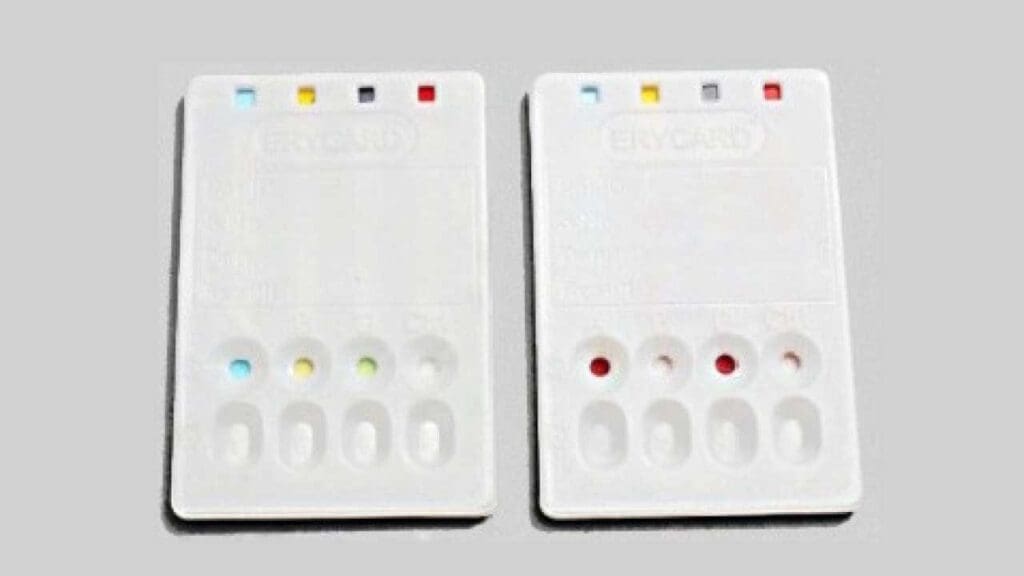
- Tests for: ABO and Rh blood types
- How it works: Buy a kit from Amazon.com and follow the instructions on the kit.
- Specimen required: Finger prick blood sample
- Results in: Within 3 minutes, with visual confirmation of agglutination.
About the test
The ALDON Innovating Science ABO/RH Blood Type Test Kit typically involves placing drops of anti-sera (anti-A, anti-B, and anti-Rh) into designated wells or areas on the sample card, adding a small blood sample to each well and wait 2 minutes. Then add 2 drops of the solution provided into each well and wait another 3 minutes. Blood well will turn clear if there are no agglutinations.
| Pros | Cons |
|---|---|
| ✅ Easy to use ✅ Clear instructions and video tutorials | ❌ Need to do finger prick using a lancet ❌ Need 20 ml of blood (5 ml for each well) ❌ Pricier than other at-home test kits |
Personalabs Blood Type Test (Walk-in Lab)
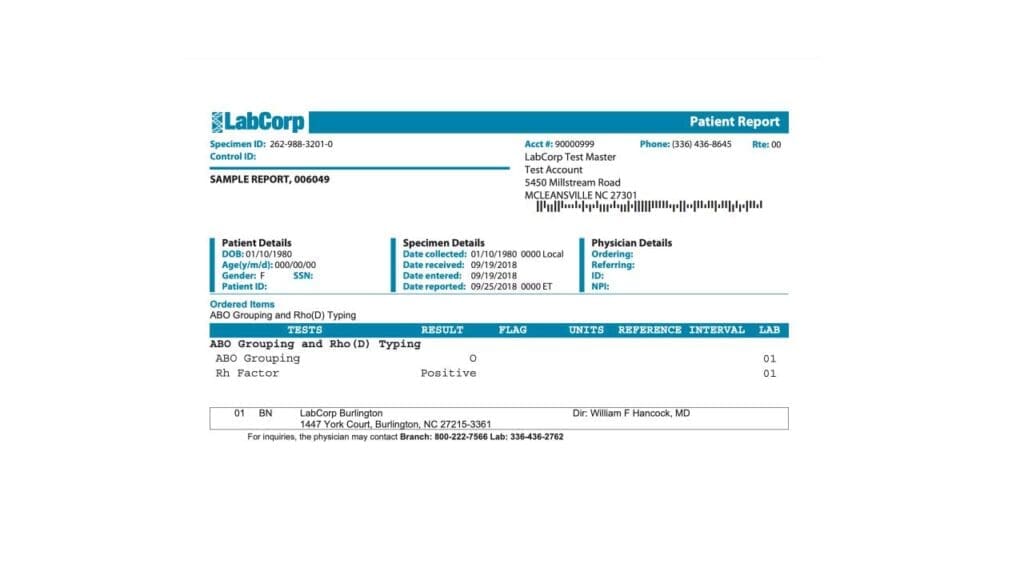
- Tests for: ABO and Rh blood types
- How it works: Buy a lab test from Personalabs.com and schedule an appointment at your nearest local lab
- Specimen required: Blood from the veins
- Results in: 2 – 10 business days
About the test
The Personalabs Blood Type Test is a laboratory-based service that requires a blood draw at a designated lab location; after purchasing the test online, you receive a lab order that you present at the chosen facility, where a phlebotomist collects your blood sample; the sample is then analyzed for ABO and Rh blood typing, and the results are securely delivered to your online Personalabs account, offering a professional and accurate method for determining your blood type without needing a doctor’s referral.
| Pros | Cons |
|---|---|
| ✅ No doctor visit required ✅ Excellent service ✅ Accurate results | ❌ Quest: Tests cannot be conducted at lab locations in Arizona, New Jersey, New York, or Rhode Island. ❌ Expensive compared to at-home test kits |
Common Myths And Concerns Surrounding Blood Type Tests
Common Myths
Myth: Blood type dictates personality
This is a popular myth, especially in some cultures. There’s no scientific evidence linking blood type to personality traits. Blood type is determined by genetics, not by personality.
Myth: Certain blood types are “stronger” or “weaker.”
All blood types are equally vital. There are some associations between certain blood types and predispositions to certain medical conditions, but this does not equate to “strength” or “weakness.”
Myth: You can change your blood type.
Your blood type is genetically determined and generally remains constant throughout your life. In very rare cases, such as after a bone marrow transplant, a person’s blood type may change, but this is a medical exception, not a common occurrence.
Myth: At home tests are not accurate.
While some low quality tests may have issues, reputable at home tests are very accurate when used correctly. Problems arise when the instructions are not followed, or if the test is expired.
Addressing Concerns
Concern: Pain from blood collection.
Finger-prick tests cause minimal discomfort, similar to a small prick. Venipuncture, while slightly more invasive, is a routine procedure performed by trained professionals.
Concern: Risk of infection.
Using sterile equipment and following proper hygiene practices minimizes the risk of infection. At-home kits typically provide sterile lancets.
Concern: Accuracy of at-home tests.
Choosing reputable brands and carefully following the instructions are essential for accurate results. If you need absolute certainty, a clinical laboratory test is recommended.
Concern: Misinterpretation of results.
At-home kits usually provide clear instructions and visual aids. However, if you have any doubts, consult a healthcare professional. Clinical laboratory tests are interpreted by trained technicians.
Concern: Cost of testing.
The cost of blood typing varies depending on the method and location. At-home kits are generally more affordable, while clinical tests may be covered by insurance in certain situations.
Concern: Privacy of test results.
Reputable companies that sell at-home tests must follow privacy laws. Labs and Doctors offices are also bound by privacy laws such as HIPAA.
Concern: Reactions to the testing materials.
While rare, allergic reactions can occur. If you have known allergies, carefully review the kit’s components. If a reaction occurs, seek medical help.
By addressing these myths and concerns, individuals can make informed decisions about blood type testing and understand the importance of accurate results.
Disclaimer: This information is for general knowledge and informational purposes only and does not constitute medical advice. Always consult with a qualified healthcare professional for any health concerns or before making any decisions related to your health.
References
- American Association of Blood Banks (AABB). Technical Manual, 21st Edition, 2023.
- Dean L. Blood Groups and Red Cell Antigens [Internet]. Bethesda (MD): National Center for Biotechnology Information (US); 2005.
- Harmening DM. Modern Blood Banking & Transfusion Practices (FA Davis Company). 2018.
- Li HY, Guo K. Blood Group Testing. Front Med (Lausanne). 2022 Feb 11;9:827619. doi: 10.3389/fmed.2022.827619. PMID: 35223922; PMCID: PMC8873177.

